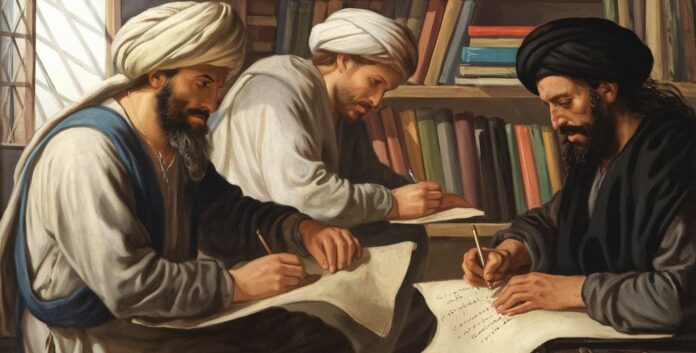- Can you imagine this modern world without electricity?
- When did the research work on the science of electricity started? Did it happen all of a sudden?
- What exactly Muslim Scientists did in the field of Science of Electricity during the Golden Age?
- Let’s understand three things very briefly – Electricity, Magnetism, Golden Age Works
What is electricity?
Electricity is a form of energy that results from the movement of charged particles, typically electrons. It is a fundamental force of nature that powers our homes, industries, and transportation systems. Electricity can be generated in various ways, such as through the burning of fossil fuels, the use of renewable energy sources, or the harnessing of nuclear power.
What is Magnetism?
Magnetism is a fundamental force of nature that causes certain materials to attract or repel each other. It is generated by the movement of electric charges. Magnets have two poles: a north pole and a south pole. Like poles repel each other, while opposite poles attract each other. Magnetism is essential for many technologies, including electric motors, generators, and data storage devices.
Magnetism plays a crucial role in the generation and transmission of electricity. The relationship between electricity and magnetism was first articulated in the early 19th century through the work of scientists like André-Marie Ampère and James Clerk Maxwell. Their findings revealed that electric currents produce magnetic fields, which in turn can induce electric currents—a principle known as electromagnetic induction.
The relationship between magnetism and electricity:
The discovery of the relationship between electricity and magnetism was crucial to the development of electrical technologies. Electromagnetic induction, the principle that a changing magnetic field can induce an electric current, was a key breakthrough that paved the way for the invention of generators and motors.
The Golden Age Researches:
The Islamic Golden Age (Start date: 622 AD End date: 1258), a period of significant scientific advancement, witnessed a surge of interest in the study of natural phenomena, including magnetism. Scholars like Al-Kindi and Al-Razi, renowned for their contributions to various fields, delved into the properties of magnets and their interactions with other materials. Their investigations laid the foundation for later European scientists who explored the relationship between magnetism and electricity.
Al-Kindi, (Abū Yūsuf Yaʻqūb ibn ʼIsḥāq aṣ-Ṣabbāḥ al-Kindī -Latin: Alkindus; c. 801–873 AD) often referred to as “The Philosopher of the Arabs,” was a polymath with a wide range of interests. His work on magnetism was part of his broader exploration of natural phenomena. Al-Kindi conducted experiments with magnets, observing their ability to attract iron and other metals. He described the phenomenon of magnetic attraction and speculated on its underlying causes. His writings provided an early framework for understanding the properties of magnets and their interactions.
Al-Razi, (Abū Yūsuf Yaʻqūb ibn ʼIsḥāq aṣ-Ṣabbāḥ al-Kindī; Latin: Alkindus; c. 801–873 AD, Iraq) a renowned physician and alchemist, also contributed to the study of magnetism. While primarily known for his medical and chemical works, Al-Razi’s investigations extended to the realm of natural philosophy. Al-Razi conducted experiments on the properties of materials, including magnetism, as documented in his texts like “Kitab al-Mansuri.” He described the use of magnetic substances and their interactions, showcasing an early understanding of magnets. His empirical methods laid essential groundwork for later studies in magnetism and its applications.
Pioneers like Al-Jazari, (Badīʿ az-Zaman Abu l-ʿIzz ibn Ismāʿīl ibn ar-Razāz al-Jazarī c. 1136–1206) in his book “The Book of Knowledge of Ingenious Mechanical Devices”, introduced automated machines powered by water and air, illustrating early concepts of energy conversion.
One notable contribution came from Ibn al-Haytham (Latinized as Alhazen; /ælˈhæzən/; Full Name: Abū ʿAlī al-Ḥasan ibn al-Ḥasan ibn al-Haytham c. 965-1040), often considered the “Father of Optics.” His experiments with light and mirrors helped to establish the principles of optics, which later became crucial in understanding electricity. He also developed the scientific method, emphasizing observation and experimentation, a foundation for modern scientific inquiry.
Experimental Method:
The Islamic Golden Age scholars’ interest in magnetism was not limited to theoretical investigations. They also explored the practical applications of magnets. For instance, some scholars may have been interested in using magnets for navigational purposes or for medical treatments. While the extent of these practical applications is unclear, they demonstrate the Islamic Golden Age scholars’ desire to connect their scientific knowledge with real-world problems.
Muslim scientists during the Islamic Golden Age (Start date: 622 AD End date: 1258) laid the groundwork for electricity through foundational studies in optics, magnetism, and natural philosophy. Scholars like Al-Kindi and Al-Razi conducted experiments on light and materials, emphasizing empirical observation, which influenced later understanding of electrical phenomena and paved the way for future discoveries in the field.
The synthesis of knowledge from these scholars helped to advance the understanding of magnetism, ultimately influencing later scientific developments in electricity. Their work exemplified the importance of empirical observation and experimentation, which were foundational to the scientific method that would lead to the eventual discovery and utilization of electricity.
Suhaib Nadvi
Laahoot Digest
Let’s connect on Social Media:
https://www.facebook.com/LaahootDigest
https://x.com/LaaHoot
https://www.youtube.com/@LaaHoot
Further reading:



